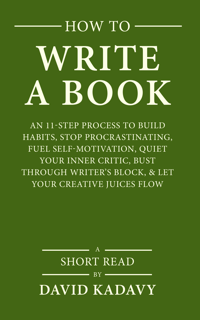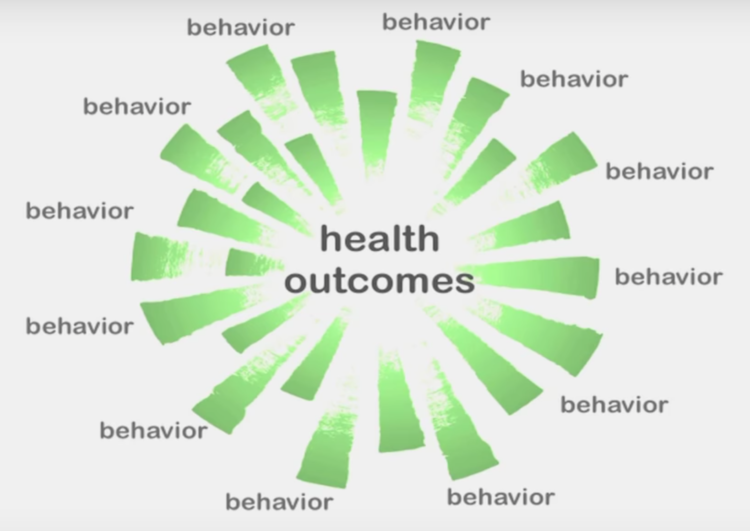Subscribe to blog updates via email »
Build Good Habits: Stanford Behavioral Scientist BJ Fogg – Love Your Work, Episode 107
 BJ Fogg (@bjfogg) is a behavioral scientist at Stanford University. He specializes in “Behavior Design,” which aims to influence people for the better through insights about human behavior. In this podcast episode, BJ breaks down how to build good habits. Listen below, or scroll down for detailed notes.
BJ Fogg (@bjfogg) is a behavioral scientist at Stanford University. He specializes in “Behavior Design,” which aims to influence people for the better through insights about human behavior. In this podcast episode, BJ breaks down how to build good habits. Listen below, or scroll down for detailed notes.
Listen to BJ Fogg on how to build good habits

WANT TO WRITE A BOOK?
Download your FREE copy of How to Write a Book »
(for a limited time)
- Listen in iTunes >>
- Download as an MP3 by right-clicking here and choosing “save as.”
- RSS feed for Love Your Work
Why do we fail to build good habits?
Most resolutions to build good habits fail for two reasons:
- We think too vaguely. We think things like “I want to eat healthier” or “I want to lose weight.” If you want to make something a reality you have to break it down into actions. Specificity makes behavior easier to change.
- Our motivation changes. You might start off trying to build good habits and feel very motivated, but your motivation will wane. You may have felt very motivated by something – such as the New Year – but that will pass. Or, life gets in the way, and that causes your priorities to change.
What are some of the hardest good habits to build?
What is a good habit? Well, that’s up to you. But some of the most common good habits that people want to build are writing, and meditation. Yet they’re the hardest.
It’s up to you what you consider to be a good habit. If you need help deciding on one popular habit: Should you make your bed? I’ve got you covered with that episode.
Since I wrote a book about building writing habits with the aim of writing a book, I’ll use that as an example to apply BJ’s concepts in this post.
The “swarm of bees” approach to build good habits
We fail to build good habits because we think to vaguely. For example, we might say we want to write a book. You can’t just sit down and write a book, especially if you’re a beginning writer. An even more vague goal you might hear from people is that they want to “eat healthy.”
Neither of these are habits. These are outcomes. They are the results of taking actions, but they aren’t actions themselves. So, it becomes mentally impossible to use them to “build good habits,” if you aren’t intentional about it.
Fogg uses a concept, in his tiny habits training program, he calls the “swarm of bees.”
You start with your vague outcome. Fogg calls it an “aspiration.” Write it down on a piece of paper. Then, write down a bunch of behaviors you could do that would help lead to that aspiration. It looks like this slide from Fogg’s TEDx talk.

The “swarm of bees” is an outcome surrounded by behaviors that could lead to that outcome.
In this slide, the aspiration is “health outcomes,” which could be something like losing weight. Let’s think of the swarm of bees as something like writing a book.
- Outcome: Write a book
- Behaviors
- Sit at computer.
- Put fingers on keyboard.
- Type.
- Read about how to write a book.
- Read about how to publish a book.
- Do market research.
- and so on…
Not all behaviors are habits: Three categories of behaviors
As you come up with behaviors to match your aspiration, you’ll find each behavior falls into one of three categories:
- One-time behaviors: Things you do just once, such as buy a book or schedule an appointment.
- Behaviors over a period of time: Things you do over a period of time, such as mow the lawn regularly over the summer.
- Habits: Things you do habitually with no time restriction. Brushing your teeth, meditating, or writing.
Pick behaviors that are a good match for you, to build good habits
Now you have an outcome you want to reach, and you have a list of behaviors that will bring you closer to that outcome. Next, you need to pick a behavior that you can build into a good habit.
But you don’t want to pick just any behavior. If you want to build good habits, the behavior has to be a good match.
Fogg recommends choosing a behavior with the following three characteristics:
- The behavior has an impact: A good behavior will take you toward your aspiration. Since you already did the swarm of bees exercise, this will be a given.
- The behavior is something you can do: The good match for you is a behavior that you’re capable of doing. If you’re a beginning writer trying to write a book, trying to build a habit of writing 5,000 words a day might be too much.
- The behavior is something you want to do: If you don’t want to do the behavior, you can’t build it into a good habit.
How many days does it take to build a good habit? It depends!
Despite what you might hear about how long it takes to build a good habit, there is no set number of times or days. (Commonly you hear the myth of “21 days” to build a good habit.)
It really depends upon the habit you’re building. Some habits are instant: The moment you touched a smart phone, using it became a habit. When Fogg got a new rocking chair, sitting in it instantly became a habit, because it was so much better than his other chair. Other habits can take more time to take root.
Good habits are like the roots of a plant
More accurately, both good habits and bad habits are like the roots of a plant. Any plant needs to take root in order to survive. You want to pull the weeds (the bad habits) before their roots get too strong, and you want to nurture the good plants (the good habits) so they can take root and thrive for a long time.
If you have a good habit going, but your life gets disrupted, you should take extra care to help that habit take root in your new circumstances. Think of it how you would think of moving a plant from one pot to another – it would need extra care.
Good habits change your personal identity
When you’ve built a good habit, meaning it’s firmly rooted, it changes your personal identity. You start to tell yourself, “I’m the kind of person who….”
Now that I’ve personally established a habit of writing, I’m more confident in my identity as a writer. “I’m the kind of person who writes.” I write every morning during my pre-established writing habit, but now I can write anytime.
Good habits have a “ripple effect.” They lead to more good habits.
Fogg has helped thousands of people build good habits through his tiny habits program. He collects data on the effects building good habits on these people.
Fogg has found that, within five days after starting to build one good habit, eighty percent of people start building other habits. They apparently say to themselves, “I’m the kind of person who builds good habits.”
Consistency matters more than scale in building good habits
When you’re trying to build good habits, consistency matters more than scale. For example, if you have a habit of writing 100 words a day, and you’re able to do it every day, that’s better than if you try to build a habit of writing 1,000 words a day, but you’re only able to do it occasionally.
Why? Because if you keep writing 100 words a day, the habit has a chance to take root. It goes from being a behavior you do for a short period of time, to being a habit that you stick with.
You really know something is a habit if it is easier to do the habit than it is to not do the habit. Think about habits like brushing your teeth or bathing. You don’t feel right if you don’t do them. They’re strongly-rooted habits. It’s a part of your identity. “[You’re] the kind of person who brushes their teeth.”
Back to the writing habit: If you try to write 1,000 words a day, it’s hard to remain consistent early on. It’s easy to make excuses such as that you’re too busy. You can’t be consistent, so the habit can’t take root.
Tiny habits are the seeds of good habits
Consistency is more important than scale. A small behavior done consistently has a better chance of taking root and changing your identity than a large behavior done inconsistently. This is why Fogg recommends tiny habits. Tiny habits are the seeds of good habits.
I’ve been talking in this post about how much better it would be to build a 100-word writing habit than to try to build a 1,000-word writing habit. Those 100 words would be the seed that takes root. Your identity changes. You’re the kind of person who writes every day. The next thing you know, you’re writing much more.
Feel good about your habit, don’t feel bad about your habit
For a habit to take root, you have to be consistent with it. You’ll have a better chance of being consistent with your habit if you feel good about that habit.
So find ways to feel good about your habit, and avoid ways that make you feel bad about your habit. Here’s a few ways to keep you feeling good about your habit, and avoid feeling bad about your habit.
Keep your good habit a tiny habit
If you want to feel good about your habit, it helps to succeed at your habit. Fogg strongly recommends that you keep your habit tiny forever. It’s counterintuitive. After all, if you want to write a book, how are you going to do it by writing just 100 words a day?
The key is to allow yourself to do your habit beyond your target. So, if you have a habit of writing 100 words a day, go ahead and write 250 words, or 1,000 words. But keep your target at 100.
I will say that I make a contradictory recommendation in my post, how to write a book. There’s value as a writer to getting really good at writing pieces of a certain length. There’s also value in building the habit of publishing. It would be incredibly complicated to study these factors, along with the factor of word count, to make a scientific recommendation on what works best.
So, Fogg still staunchly stands by keeping your habit tiny. He’s a scientist, and that’s what he knows works.
Congratulate yourself for performing your good habit
Every time you do your habit, celebrate in some way. You could have a reward for yourself, but you can also merely tell yourself that you did a good job. This will keep you feeling good about your habit, and prevent you from feeling bad about your habit.
In the writing example, let’s say you have a tough day of writing. But, you wrote 100 words. Don’t feel bad. Instead, congratulate yourself for performing your good habit for the day. Again, if you go past 100 words, that’s great, but really congratulate yourself for merely writing 100 words.
Lower your standards to feel good about your habit
Ambitious people tend to have high standards. Not only do they want to write 1,000 words a day, they expect those words to be great.
This just adds another opportunity to feel like you’ve failed at your habit. Worse yet, you may keep yourself from starting your habit in the first place.
This is why, in my book The Heart to Start, I say you should give yourself “permission to suck.” If you’re writing badly every day, you have a much better chance of becoming good at writing if you instead decide not to write at all, just because you don’t think you’re a good writer.
You’d find yourself in a Catch-22 situation: You can’t get good at writing because you won’t practice it. You won’t practice writing because you don’t feel that you’re good at it.
Don’t count habit “streaks”
Fogg recommends against counting “streaks,” for your habits. Habit streaks create another opportunity for you to feel bad about your habit, which can lead to you not performing the behavior, which can prevent the habit from taking root.
Imagine, for example, that you have a good habit of writing 100 words a day, and you’ve counted a streak of twenty days. Then, you miss your habit for some reason – maybe you were sick or you had house guests.
Now, not only do you feel bad about missing your streak, you also have the sensation of starting your streak all over again. It’s as if you’re committing to 10,000 words, rather than 100. It would then be easy to abandon your good habit altogether.
In summary…
- Find behaviors that fit your aspiration.
- From those behaviors, find a good habit match.
- Build tiny habits.
- Feel good about your habits. Don’t feel bad about your habits.
Subscribe to Love Your Work
Join the Patreon for (new) bonus content!
I've been adding lots of new content to Patreon. Join the Patreon »
Theme music: Dorena “At Sea”, from the album About Everything And More. By Arrangement with Deep Elm Records. Listen on Spotify »



